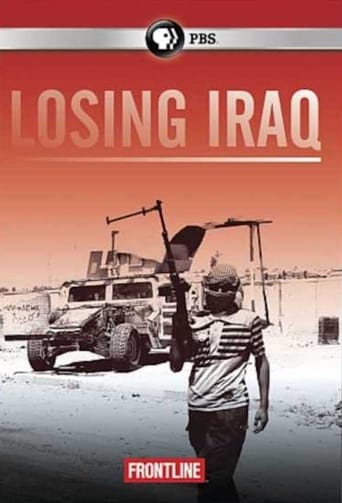

not as good as all the hype
... View MoreIt’s fine. It's literally the definition of a fine movie. You’ve seen it before, you know every beat and outcome before the characters even do. Only question is how much escapism you’re looking for.
... View MoreThis is a small, humorous movie in some ways, but it has a huge heart. What a nice experience.
... View MoreStrong acting helps the film overcome an uncertain premise and create characters that hold our attention absolutely.
... View MoreThat title (or something like it) went to Malikki's predecessor; Saddam Hussein. This Frontline episode looks at the political, social and military forces and events that lead to the buildup and explosion of ISIS on Northern Iraq.The program interviews top military and civil leaders who were involved in the Iraq reconstruction effort after our invasion there. It looks at the various phases of violence and what could be characterized as Hussein backed "resistance fighters" to our forces within Iraq.It is long, and unlike its successor, "Confronting ISIS", is far better researched. We don't hear interviews with Bush, Obama, Cheyney, Rice, et al, but we do hear from the people they appointed to administer Iraq during Operation Iraqi Freedom.There is an examination of the "Light Footprint" theory of dealing with Iraq, and where the documentary, like nearly all of Frontline's well researched and presented pieces, doesn't take a position on said theory, it does show the ramifications of it, and shows how those leading the Iraq effort felt the need for a reinforcement (strangely labeled "a surge" ... who comes up with these labels? How come "reinforcement(s)" wasn't good enough? Oh well...).But in this two hour long piece, toward the last third or rather fourth of the documentary, we come to the Malikki factor. And the films shows and presents this man's efforts to undermine everything our armed forces and civilian administration had spent years in building after toppling Saddam Hussein.The middle east, in my opinion, is still a medieval society. You have opportunists everywhere. And where we in the United States and in Europe and elsewhere have mechanisms of dealing with such people, it's clear the Middle East does not. From sociopaths to petty yet sophisticated crime syndicates, we know how to deal with them. The middle east, and Iraq in this case, does not. Ergo these people get into the power structure and destroy all of our hard work so as to make the blood and treasure we spent all for nothing.Highly informative.
... View More